June 13, 2025 | 18:17 GMT +7
June 13, 2025 | 18:17 GMT +7
Hotline: 0913.378.918
June 13, 2025 | 18:17 GMT +7
Hotline: 0913.378.918
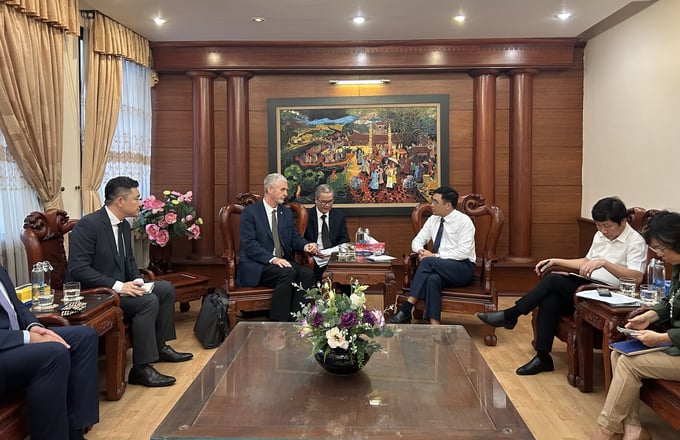
Deputy Minister of Agriculture and Rural Development Nguyen Quoc Tri received and talked to the Director-General of the Global Green Growth Institute (GGGI) Frank Rijsberman. Photo: Linh Linh.
Discussing topics related to emission reduction and green growth, the GGGI representative shared projects proposed and implemented by the Institute, such as the KGNDF biochar project for climate-resilient agriculture in Vietnam; the Methane Reduction Project with the Ministry of Industry and Trade, the Ministry of Agriculture and Rural Development, and the Ministry of Natural Resources and Environment; the ASEAN-South Korea Cooperation Project on Methane Reduction, and the low-emission rice project with the World Bank.
The Director-General of the Global Green Growth Institute (GGGI) Frank Rijsberman, explained that while each of these projects may not have a high individual value, when considered together, they will make a significant contribution to the investment portfolio. These projects are also in line with the strategic objectives of the 1-million-hectare high-quality, low-emission rice project in the Mekong Delta, also known as the 1-million-hectare rice project.
According to Mr. Nguyen Do Anh Tuan, the Director of the International Cooperation Department at the Ministry of Agriculture and Rural Development, Vietnam's commitment to reducing emissions, specifically methane, on an international level is the driving force behind the development of the 1-million-hectare rice program in the Mekong Delta.
The project will be executed with resolute commitment from the topmost management level to the local farmers. However, Vietnam's resources remain fairly limited, particularly in terms of access to knowledge, practical expertise in reducing emissions, measuring emissions, and research assistance.
Mr. Nguyen Do Anh Tuan stated that the Ministry of Agriculture and Rural Development has started implementing Measurement, Reporting, and Verification (MRV) activities, improving cooperative abilities, and enhancing the capabilities of community-based agricultural promotion systems to practice agriculture with reduced emissions. This has been made possible with the support of the trust fund provided by the World Bank. Capacity-building training will be ongoing until 2030 for the project duration of cultivating 1 million hectares of rice.
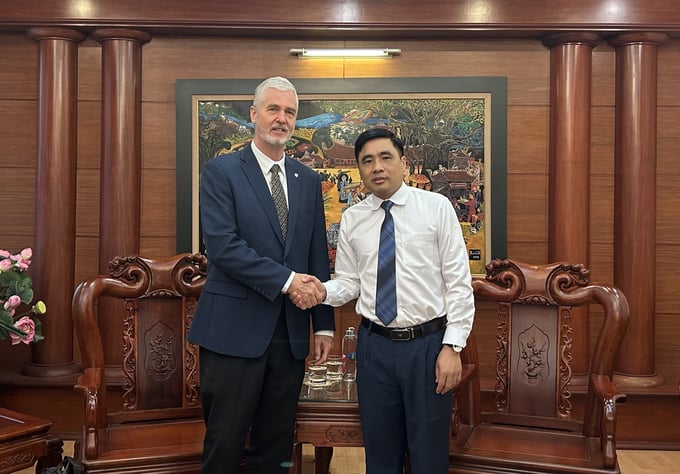
The Deputy Minister suggested that the GGGI assist in developing instruments to evaluate the current level of emission absorption in Vietnam, as well as explore innovative technologies in this area. Photo: Linh Linh.
Thus, the representative from the International Cooperation Department requested a dedicated working session with the GGGI representative and relevant units to gain a comprehensive understanding of this project and the practical requirements on emission reduction in Vietnam.
Deputy Minister Nguyen Quoc Tri expresses strong admiration for the 12-year history of the GGGI's projects in Vietnam.
Following a two-year period since the signing of the Memorandum of Understanding between the GGGI and the Ministry of Agriculture and Rural Development in Vietnam, the Deputy Minister confirmed that the two parties had established productive collaborative ties in the field of agriculture. The GGGI has specifically organized and assisted the Ministry of Agriculture and Rural Development in improving their skills in green growth and green transformation. This includes transferring research findings and new technologies to the agricultural and rural development sector, as well as enhancing their abilities in measuring greenhouse gas emissions, implementing emission reduction technologies, and developing agricultural models.
Deputy Minister Nguyen Quoc Tri shares the belief that the initiatives endorsed and executed by the GGGI in Vietnam are crucial, and significant, and make a valuable contribution to the promotion of sustainable development and green growth in the agriculture sector.
"By prioritizing green growth, we not only uphold our commitments to the global community but also recognize it as a catalyst for the sustainable advancement of our nation. We aim to minimize emissions in agricultural activities and maximize emission absorption.
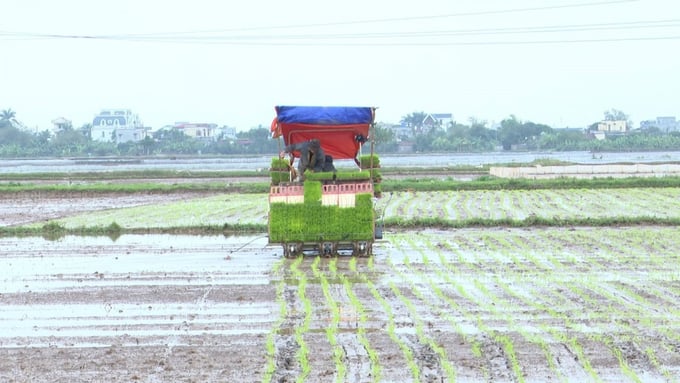
In crop production, a mere 0.4% of carbon sequestered in the soil is essential for achieving existing climate change mitigation goals. Photo: TL.
Deputy Minister Nguyen Quoc Tri proposed that the GGGI assist in assessing the level of emission reduction for the 1-million-hectare rice project and determining how to include these reductions in the costs of the products. This would enable farmers in the Mekong Delta to fully comprehend the actual worth of cultivation practices that cut emissions.
The Deputy Minister suggested that the GGGI assist in developing instruments to evaluate the current level of emission absorption in Vietnam, as well as explore innovative technologies in this area.
Mr. Frank Rijsberman stated that the GGGI aims to assist the Vietnamese agricultural sector in fully understanding the benefits of engaging in emission reduction measures.
He argued that addressing the financial implications of emission reduction for farmers necessitates the implementation of techniques such as marketing, certification, and verification for low-emission rice products. This not only benefits agricultural producers but also enhances the competitiveness of exported goods.
The GGGI representative is confident that the Vietnamese agricultural industry can benefit from numerous prospects associated with carbon sequestration. Carbon absorption has tremendous potential not just in forestry activities such as afforestation and forest preservation, but also in agriculture.
Mr. Rijsberman referenced researches during his tenure as CEO of the Consultative Group on International Agricultural studies (CGIAR), which indicates that a mere 0.4% of carbon sequestered in the soil is essential for achieving existing climate change mitigation goals.
Translated by Dieu Linh - Hoang Duy

(VAN) The Department of Agriculture in South Africa has announced the country’s first mass vaccination of poultry to prevent local birds from contracting avian influenza.

(VAN) Establishment of the Mekong Delta Regional Agricultural Linkage Center, aiming for a closed value chain, deep processing, trading platforms, and international market connectivity.

(VAN) Gia Lai province has recently recorded 460 rare species of animals and plants, contributing to forest conservation and biodiversity planning in the region.

(VAN) Ms. Caroline Beresford, New Zealand Ambassador to Vietnam, expressed confidence that agricultural cooperation between Vietnam and New Zealand will develop sustainably, be climate-resilient, and promote gender equality.

(VAN) Vietnam reaffirms its commitment to international cooperation in fostering sustainable and responsible fisheries while ensuring resilient livelihoods for small-scale fishing communities.
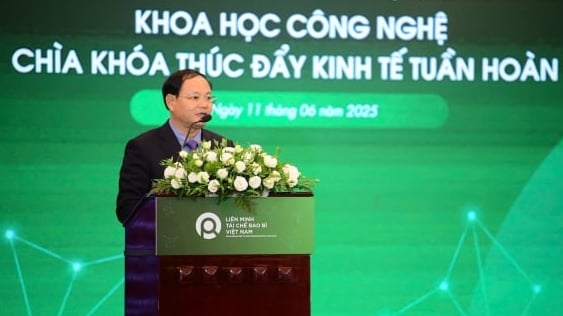
(VAN) More than just a technical solution, science and technology are gradually becoming a cornerstone in Vietnam’s journey toward building a circular economy.
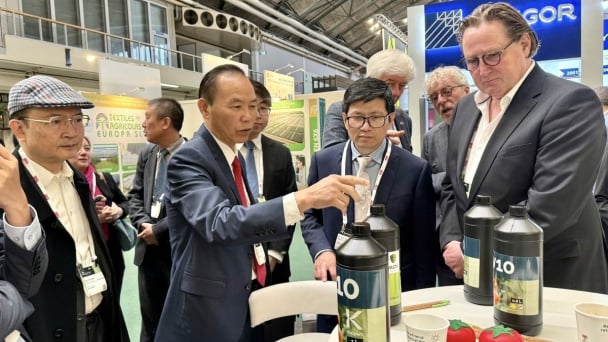
(VAN) The Netherlands is ready to accompany Vietnam in building a green, circular, and sustainable agriculture sector that is resilient to climate change.